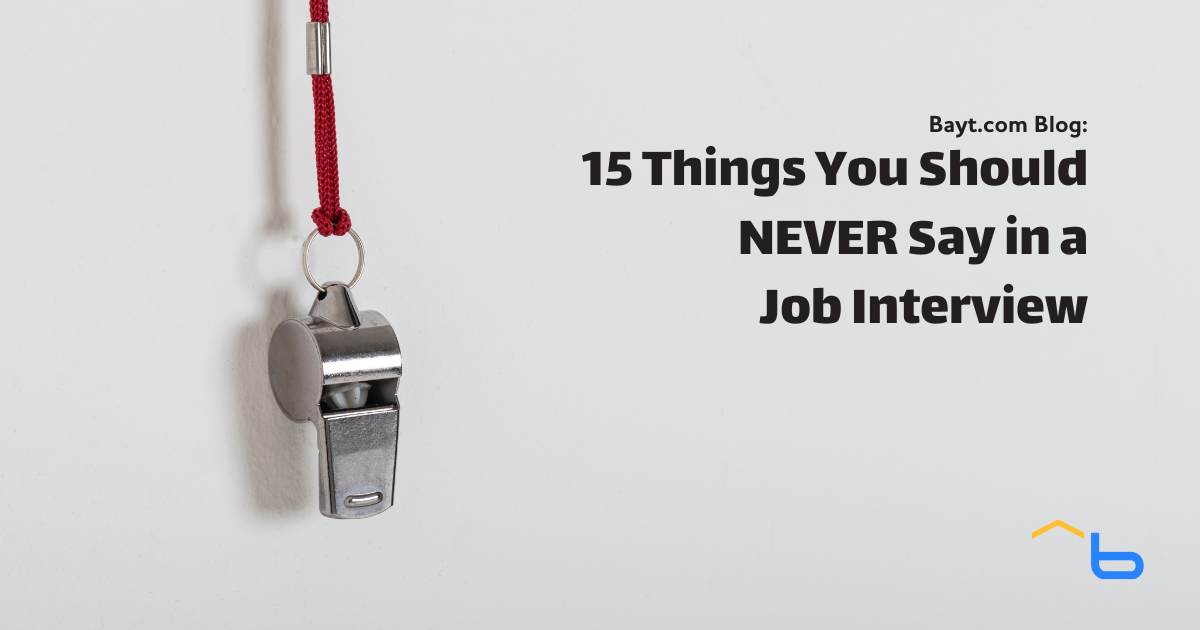
The job interview: a nerve-wracking dance of questions, answers, and hopeful first impressions. While you want to showcase your skills and enthusiasm, there are certain phrases that can act like landmines, derailing your candidacy.
While preparing what to say is crucial, knowing what not to say can be equally important. Your words can either impress potential employers or raise doubts about your suitability for the role.
1- "I'm nervous."
Admitting nervousness might seem like a way to be honest and relatable, but it can raise doubts about your ability to handle pressure. Instead, take a deep breath, maintain eye contact, and project confidence even if you're feeling jittery inside. And stop bouncing your legs.
2- "I'll do anything!"
While enthusiasm is commendable, expressing a willingness to do anything can make you seem desperate and lacking direction (NOT a good look on anyone). Instead, emphasize your specific skills and experiences that align with the role and the company's needs.
3- "I don't know."
When faced with a tough question, saying "I don't know" can make you appear unprepared or lacking in knowledge. Instead, offer to brainstorm or provide insights based on what you do know. Employers value problem-solving skills and the ability to think on your feet.
4- "It's on my CV."
They’ve seen and read your CV - trust me. Referring the interviewer back to your CV can come across as dismissive and lazy. Instead, use the opportunity to elaborate on the experiences or achievements listed on your CV and how they make you a strong candidate for the role.
5- "My previous boss was terrible."
Speaking negatively about past employers or colleagues reflects poorly on your professionalism and may raise concerns about your ability to work well with others. Focus on the positives of your past experiences and what you learned from challenges. We’ve all had a horrible boss at some point, but keep that ranting for your night out with friends.
6-"What does your company do again?"
Failing to research the company before the interview demonstrates a lack of interest and initiative. Make sure you understand the company's mission, values, products, and recent news to show that you're genuinely interested in the opportunity.
7- "I'm just looking for anything."
Employers want to hire candidates who are genuinely interested in their specific role and company, not someone who seems desperate for any job. Tailor your responses to demonstrate how your skills and experiences align with the position and the company's goals.
8- "I'm really just here for the salary."
While we’re all after financial stability (I mean, who doesn’t love a loaded bank account?), emphasizing its importance too much can make you seem disengaged and unmotivated by the actual work. Focus instead on what excites you about the role and how you can contribute to the company's success beyond just earning a salary.

9- "I don't have any weaknesses."
Claiming to have no weaknesses comes across as arrogant and unrealistic. Everyone has areas where they can improve, and being aware of your weaknesses demonstrates self-awareness and a willingness to grow. Instead, discuss a genuine weakness and how you're actively working to overcome it.
10- "I left my last job because I didn't like it."
Discussing reasons for leaving previous roles should be approached delicately. Blaming a previous employer or expressing dissatisfaction can raise red flags for potential employers. Instead, focus on your desire for new challenges or opportunities for growth.
11- "I'm not sure if I can commit to long-term."
This is basically you telling them that you’re only sticking around until something better comes along. Major red flag. Employers want to invest in candidates who are committed to staying with the company and contributing to its success. Expressing uncertainty about your long-term commitment can make you seem unreliable. Even if you're unsure about your future plans, emphasize your enthusiasm for the role and your willingness to grow with the company.
12- "Do you mind if I take this call?"
Interrupting the interview to take a phone call, check a message, or respond to a notification is highly disrespectful and unprofessional. Make sure to silence your phone and give the interviewer your undivided attention throughout the entire interview process.
13- "I'm not a morning person."
All they’ll hear is that you’re going to be late every morning. Discussing personal preferences or limitations unrelated to the job can signal inflexibility and unwillingness to adapt. Instead, focus on your ability to meet the job requirements and perform effectively regardless of the time of day.
14- "I don't have any questions."
Not asking questions at the end of an interview can indicate a lack of interest or curiosity about the role and the company. Prepare thoughtful questions in advance to demonstrate your engagement and interest in the opportunity.
15- "I'm the perfect candidate for this job."
While confidence is important, claiming to be the perfect candidate can come across as arrogant and dismissive of other applicants. Instead, focus on highlighting your relevant skills, experiences, and passion for the role, letting the interviewer draw their own conclusions about your suitability.